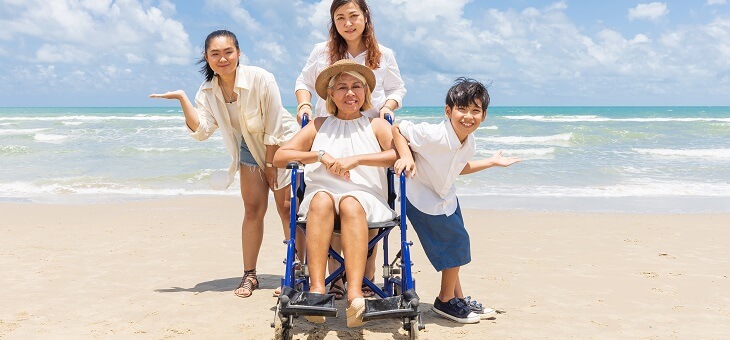Researchers have identified a new potential treatment for mental health and wellbeing, including conditions such as dementia. And it’s likely one you haven’t heard of before: travel therapy.
You will have likely heard of music therapy and art therapy – but travel therapy is a new one to add to the list.
A cross-disciplinary paper from Edith Cowan University (ECU) proposes we change the way we view tourism, seeing it not just as a recreational experience but as an industry that can provide real health benefits.
Though travelling has long been seen as a fun leisure activity, the team of health, tourism and marketing experts looked at the industry through a public health lens and found a lot of crossover between tourism and recommended treatments for dementia.
It’s one of the first studies of its kind and could spark a new area of research identifying how tourism can have positive health benefits for both healthy tourists and vulnerable groups.
Read: Enjoy the mental health benefits of a holiday
The collaboration between ECU’s Centre for Precision Health and School of Business and Law found many aspects of going on holiday could have a positive impact on those with mental health issues or conditions.
Lead researcher Dr Jun Wen said the diverse team of tourism, public health and marketing experts investigated how tourism could benefit those living with dementia.
“Medical experts can recommend dementia treatments such as music therapy, exercise, cognitive stimulation, reminiscence therapy, sensory stimulation and adaptations to a patient’s mealtimes and environment,” Dr Wen said.
“These are all also often found when on holidays. This research is among the first to conceptually discuss how these tourism experiences could potentially work as dementia interventions.”
Holiday fun … or treatment?
Dr Wen said the varied nature of tourism meant there were many opportunities to incorporate treatments for conditions such as dementia.
For example, being in new environments and having new experiences could provide cognitive and sensory stimulation.
“Exercise has been linked to mental wellbeing and travelling often involves enhanced physical activity, such as more walking,” Dr Wen said.
“Mealtimes are often different on holiday: they’re usually more social affairs with multiple people and family-style meals have been found to positively influence dementia patients’ eating behaviour.
“And then there are the basics such as fresh air and sunshine increasing vitamin D and serotonin levels.
“Everything that comes together to represent a holistic tourism experience makes it easy to see how patients with dementia may benefit from tourism as an intervention.”
Read: Five expert tips to help you switch off on holiday
A shift in thinking
Dr Wen said COVID-19’s impact on travel in recent years had raised questions about tourism’s value beyond lifestyle and economic factors.
“Tourism has been found to boost physical and psychological wellbeing,” he said.
“So, after COVID, it’s a good time to identify tourism’s place in public health – and not just for healthy tourists, but vulnerable groups.”
Dr Wen said he hoped a new line of collaborative research could begin to examine how tourism can enhance the lives of people with various conditions.
“We’re trying to do something new in bridging tourism and health science,” he said.
“There will have to be more empirical research and evidence to see if tourism can become one of the medical interventions for different diseases like dementia or depression.
Read: How a holiday to Fiji will make you happier
“So, tourism is not just about travelling and having fun; we need to rethink the role tourism plays in modern society.”
What do you think of tourism as a dementia treatment? Let us know in the comments section below.
If you enjoy our content, don’t keep it to yourself. Share our free eNews with your friends and encourage them to sign up.

